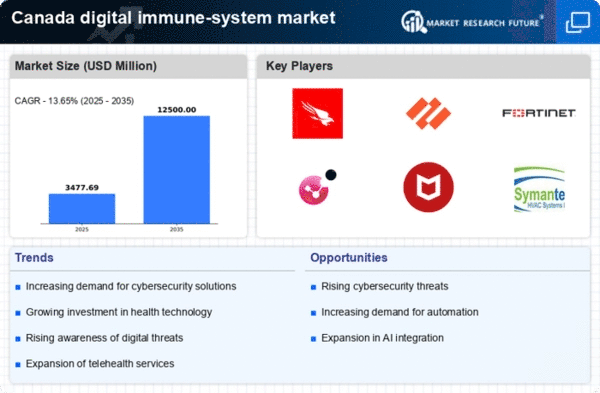Rising Cyber Threats
The digital immune-system market is experiencing growth due to the escalating frequency and sophistication of cyber threats in Canada. Organizations are increasingly recognizing the necessity of robust cybersecurity measures to protect sensitive data and maintain operational integrity. In 2025, it is estimated that cybercrime could cost Canadian businesses upwards of $10 billion annually, prompting a surge in demand for advanced digital immune systems. This market driver highlights the urgency for companies to invest in comprehensive cybersecurity solutions that can adapt to evolving threats. As a result, the digital immune-system market is likely to see a significant uptick in adoption rates, as businesses strive to safeguard their digital assets against potential breaches.
Technological Advancements
The rapid pace of technological advancements is a key driver for the digital immune-system market. Innovations in artificial intelligence, machine learning, and automation are transforming how organizations approach cybersecurity. In Canada, the integration of these technologies into digital immune systems enhances threat detection and response capabilities, making them more effective against emerging cyber threats. By 2025, it is projected that the market for AI-driven cybersecurity solutions will grow by approximately 30%, reflecting the increasing reliance on technology to bolster security measures. This trend indicates that organizations are prioritizing investments in advanced digital immune systems to stay ahead of potential vulnerabilities.
Increased Regulatory Scrutiny
The digital immune-system market is influenced by heightened regulatory scrutiny in Canada, as government bodies implement stricter data protection laws. Organizations are compelled to comply with regulations such as the Personal Information Protection and Electronic Documents Act (PIPEDA), which mandates the safeguarding of personal data. Non-compliance can result in substantial fines, prompting businesses to invest in digital immune systems that ensure adherence to these regulations. As of 2025, it is anticipated that compliance-related expenditures will account for nearly 20% of total cybersecurity budgets in Canada. This driver underscores the importance of integrating regulatory compliance into the digital immune-system market, as organizations seek to mitigate legal risks while enhancing their security posture.
Demand for Remote Work Solutions
The shift towards remote work has created a substantial demand for enhanced cybersecurity measures, thereby impacting the digital immune-system market. As more organizations adopt flexible work arrangements, the need to secure remote access to sensitive data has become paramount. In Canada, it is projected that by 2025, over 50% of the workforce will engage in remote work, necessitating robust digital immune systems to protect against potential vulnerabilities associated with remote access. This driver suggests that organizations are increasingly investing in solutions that provide secure remote connectivity, thereby expanding the digital immune-system market as they seek to protect their digital infrastructure in a changing work environment.
Growing Awareness of Cybersecurity Risks
There is a growing awareness of cybersecurity risks among Canadian businesses, which is driving the digital immune-system market. As high-profile data breaches make headlines, organizations are becoming increasingly cognizant of the potential repercussions of inadequate cybersecurity measures. This heightened awareness is leading to a cultural shift within companies, where cybersecurity is prioritized at all levels of management. By 2025, it is expected that nearly 70% of Canadian organizations will have implemented comprehensive cybersecurity training programs for employees. This trend indicates that businesses are not only investing in digital immune systems but also fostering a security-conscious culture, which is essential for effective risk management.
















